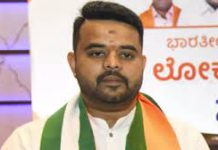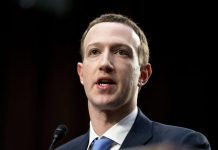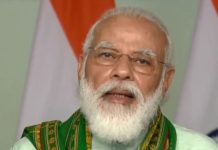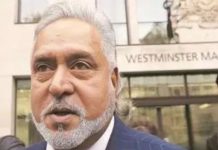The UK government’s response came after the MPs, mainly from the Opposition benches, condemned the hitherto silence of the Conservative government and asked what diplomatic steps had been taken to convey the country’s opposition to the raids, writes Mudit Mathur
The British government has strongly shielded the BBC and its editorial freedom in the House of Commons over the Income-Tax department’s three-day long survey operations at the UK-headquartered media corporation’s New Delhi and Mumbai offices following the release of the BBC documentary on Indian Prime Minister Narendra Modi. The UK government has for the first time publicly defended the BBC since the turmoil over its controversial two-part documentary–“India: The Modi Question.”
David Rutley, parliamentary under-secretary for Foreign, Commonwealth and Development office, said in a House of Commons debate, “We stand up for the BBC. We fund the BBC. We think the BBC World Service is vital. We want the BBC to have that editorial freedom. It criticises us, it criticises the Labour party, and it has that freedom that we believe is so important. That freedom is key, and we want to be able to communicate its importance to our friends across the world, including the Government in India.” He added, “The UK has wide-ranging conversations with the Indian government. These issues have absolutely been raised as part of those conversations”.
The UK government’s response came after the Members of Parliament, mainly from the Opposition benches, condemned the hitherto silence of the Conservative government and asked what diplomatic steps had been taken to convey the UK government’s opposition to the “raids” and what steps were being taken to “protect the BBC World Service from intimidation?”
“As everyone in this House will be aware, the BBC is quite rightly operationally and editorially independent from His Majesty’s Government. While I cannot comment on the allegations made by India’s Income Tax Department, the BBC has said that it is supporting its staff in its Indian offices and co-operating with the Indian authorities to resolve this matter as soon as possible,” Rutley informed.
“Respect for the rule of law is an essential element of an effective democracy, as are an independent media and freedom of speech. They make countries stronger and more resilient. That is why we regularly engage with and support different parts of India’s media,” he contended, citing an example of the annual south Asia journalism fellowship programme, under the flagship Chevening brand, which includes over 60 Indian alumni.
Rutley further dwelled on significant UK-Indo diplomatic ties. “The UK regards India as an important international partner, and His Majesty’s Government is investing heavily in strengthening our ties,” he said.
Raising supplementary query on the response of the Minister, Jim Shannon said, “Let us be clear that this was a deliberate act of intimidation following the release of an unflattering documentary about the country’s leader. Since its release, there has been a concerted effort to prevent the documentary from being screened in India. Take-down notices issued to Twitter and YouTube have resulted in an India-wide ban of the documentary on those platforms. There has been suppression of the freedom of expression of the media and journalists. When students from universities across the country have tried to organise screenings of the documentary on university campuses, dozens have been arrested, while others face internet blackouts through power cuts.”
“As the raids on the BBC offices commenced, the Bharatiya Janata party spokesperson issued a statement that said: The BBC indulges in anti-India propaganda. India is a country which gives an opportunity to every organisation as long as you do not spew venom,” Shannon added.
“These raids have all the appearance of a reprisal against the BBC…They have come at a time when independent media are being hounded more and more, and when pluralism is shrinking in India,” Shannon said.
“The raids happened seven days ago. Since then—I say this respectfully—there has been silence from the Foreign, Commonwealth and Development Office. No Government statements have been issued, and it has taken an urgent question to encourage the Government to condemn this blatant attack on press freedoms. Alarmingly, the raids happened hours after the Government signed a trade deal with India. That has led to allegations that the silence from the Government is due to the proximity of the raids to that deal. In conclusion, can the Minister tell me and the House whether the Government intends to summon the Indian high commissioner, so that his counterparts can raise the issue with him?” asked Democratic Unionist Party (DUP) Member for Strangford, Jim Shannon.
In reply, David Rutley said, “I noted a bit of coughing going on, which will give him a clue to a few things. The UK’s support for media freedom is well known. Media freedom and freedom of speech are essential elements of robust democracies. As I said in my opening remarks, I cannot comment on the specifics of the allegations, because the BBC is cooperating with the Indian authorities on the matter, and as the BBC has said, this is an ongoing investigation and it would be inappropriate for it to comment further.”
Sir Julian Lewis, Conservative MP for New Forest East, redrawing the attention of the House, said, “The very important work done by the BBC Monitoring service. Does not this extremely worrying raid on the BBC, in a country as advanced and potentially well disposed towards this country as India, once again illustrates the importance of not placing too much reliance on sources in countries on which we are reporting, because there is always the potential for action to be taken against local sources? Services such as Monitoring should have strong representation in this country, to guard against disturbing events of the sort that we have seen.”
Rutley, while addressing Sir Julian Lewis’s concerns, said, “I highlight that we believe that the BBC plays an important role. The FCDO funds services in 12 languages, including four Indian languages: Gujarati, Marathi, Punjabi and Telugu. It will continue to do so, because it is important to ensure that our voice—and an independent voice, through the BBC—is heard throughout the world.”
Fabian Hamilton, the Labour MP for Leeds North East,while expressing his concern over the issue saying, “India has a rich heritage and is rightly proud of its place as the world’s largest democracy. However, in a democracy with true media freedoms, criticism cannot be shut down unnecessarily and freedom of expression must be protected at all costs. Last week’s raids on the BBC in India are therefore deeply worrying, regardless of the official narrative on why they took place. The BBC is a globally respected broadcaster, rightly renowned for its high-quality, trustworthy reporting. It should be free to report and operate without intimidation. We Opposition Members are particularly worried about reports that BBC staff were forced to stay in their offices overnight, and have faced lengthy questioning. In any democracy, the media must have the ability to criticise and scrutinise political leaders without fear of repercussions.”
David Rutley in reply said, “It is because of our broad and deep relationship with India that we are able to discuss a wide range of issues in a constructive manner with its government. As part of those conversations, this issue has been raised and we continue to monitor the situation.”
Participating in the debate, Drew Hendry, MP of the Scottish National Party (SNP) for Inverness, Nairn, Badenoch and Strathspey, said, “The SNP condemns this alarming attack on the BBC offices in New Delhi and Mumbai. The BBC World Service is a renowned and respected news outlet. For decades it has shone a light on global affairs, including human rights abuses and undemocratic practices.”
“Human rights abuses, discrimination and governmental scapegoating against India’s religious minorities are well documented. Political transparency and freedom of press are essential, but the BJP seems content to violate those principles. Does the Minister agree that additional funding is now necessary to ensure that the BBC World Service’s independent and unbiased radio broadcasts in Hindi are not cut? Given these appalling raids, will the FCDO reconsider its approach to negotiations on the release of Jagtar Singh Johal, for whom the softly-softly approach does not seem to be working?” Hendry remarked.
Responding to the observations and queries raised by Scottish parliamentarian, Rutley said, “As I said in answer to a previous question, the Government have put a package of funding together for the World Service, and the FCDO has provided funding particularly for those four languages I highlighted earlier, because we believe it is vital for the BBC to have that independent voice and to have the reassurance that it can carry on its work.”
Other parliamentarians who participated in the debate include Hilary Benn, Labour MP for Leeds Central, Martin Docherty-Hughes, the Scottish National Party MP for West Dunbartonshire, Afzal Khan, the Labour MP for Manchester, Gorton, Jamie Stone, the Liberal Democrat MP for Caithness, Sutherland and Easter Ross, Tanmanjeet Singh Dhesi, the Labour MP for Slough.
Madam Deputy Speaker, Dame Rosie Winterton chaired the proceedings concluded with thanks to Minister Rutley for answering urgent questions.













